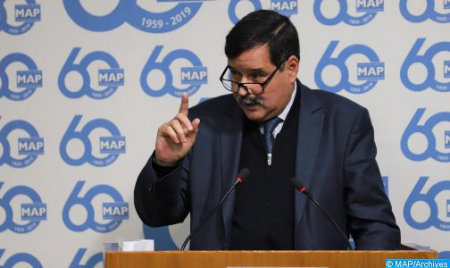Green March Preserved Rights of Homeland, Reinvigorated Immunity in History – Moroccan Journalist
The Green March “protected Morocco against the loss of part of its territory and the plundering of its history […] It preserved the rights of the homeland and reinvigorated its immunity in history,” writes Journalist Talaâ Saoud Al Atlassi. In an article entitled “The March, self-determination and … the path”, the writer considers that this popular March was rooted in a royal vision of management of the homeland, a reason why this March was patriotic in terms of participation and also in terms of its impact on the entire Moroccan society. He explained that the Green March, a genius idea of late HM Hassan II, has maintained its relevance for decades, stressing that it is not only a fact gloriously recorded in the annals of history, but a reality that continues to produce its effects today. An epic that completes the construction of the Moroccan nation, based on national, democratic and development pillars. In this same context, the columnist noted that the late HM King Hassan II has developed a strategy for managing post-colonial Morocco, among its foundations the democratic choice through the preservation of party pluralism, and the launch of the site of agricultural reform, including the construction of dams. The third axis of this strategy, continues Saoud Al Atlassi, was “the commitment of the Sovereign to complete the territorial integrity of the Kingdom, working to recover the southern provinces of the Kingdom in addition to Sebta and Melilla.” The writer notes, in this regard, that Morocco recovered Tarfaya and Sidi Ifni and continued its efforts at the level of the United Nations during the 1960s and early 1970s with the aim of ending colonialism of the occupied Moroccan territories. “Thanks to his foresight and genius, the late Hassan II launched the Moroccan popular participation in the recovery of our southern provinces through the Peaceful March… Since then, a historic process has continued to grow and triumph for the Moroccan Sahara and for Morocco and open to the Maghreb region in general,” writes Al Atlassi. The Green March, he continues, remains “rooted in this country … as if it occurred every day for the first time … Acting in terms of development, consolidation of democratic choice, societal modernization, economic recovery and industrial development.” “HM King Mohammed VI has continued on the same path, while making qualitative changes and at a faster pace, and launching His reform and modernization project based on the philosophy of the Green March. A strategy based on the national dimension, the democratic spirit and the social component,” said the writer. Within the framework of this strategy, stresses Al Atlassi, a series of deep and continuous reforms has emerged and an effective, serene and comprehensive revolution has affected all political, social, economic and cultural structures. Reforms that have given a renewed dynamic to the various structures and institutions and allowed the emergence of the Autonomy Plan in the southern provinces of the Kingdom. Citizens in the southern provinces insist, since the organization of the Green March, “on their Moroccan identity, through national referendums and dozens of local and legislative elections … and prove it through their continued involvement in political, economic, social and cultural activities that punctuate the Moroccan Sahara and the entire Moroccan territory today.” The Moroccan Autonomy Plan, comments Al Atlassi, is “a sure path to the future that is likely to extricate the polisario from its illusions … illusions fed by the Algerian regime and directed against Morocco. Illusions that are strongly dissipated by the reality in Morocco, and by the developments in international politics… “Under the Moroccan Autonomy Plan, the polisario could dispose of itself, join the path of progress in Morocco and free itself from the grip of the Algerian regime,” says Al Atlassi. He added that the Moroccan Autonomy Plan “is in itself an opportunity for the Algerian regime to open a new path with Morocco, other than the one that has led him to put himself at odds with the interests of Morocco. Interacting positively with the Moroccan Autonomy Plan, says Al Atlassi, can only honor Algeria, called to reconcile with itself and overcome the legacy of the past, in order to see a cooperation with Morocco in the mutual interest of both countries and peoples.

